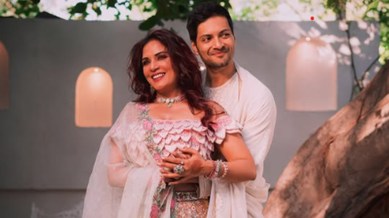📣 For more lifestyle news, click here to join our WhatsApp Channel and also follow us on Instagram
‘He’s married and has two kids’: Richa Chadha once recalled her mom’s hilarious confusion over Ali Fazal; why introducing your partner can worry your parents
On a podcast, Richa said, “Ali plays this character called Zafar in 'Fukrey'. His real name is Ali Fazal.”

Actor Richa Chadha, who married Ali Fazal in 2022, once opened up about her mother’s hilarious initial reaction when she told her she was dating someone named Ali.
On the All About Eve podcast, Richa revealed, “Ali plays this character called Zafar in ‘Fukrey‘. His real name is Ali Fazal. There’s another actor called Ali Zafar, so a lot of people just confuse the names.” She continued, “When I first told my mom that I was starting to date this guy, she was very alarmed. She said, ‘I don’t know if you know he is married and has two kids’. I was like ‘what?!’ She’s like ‘yeah, he is from Lahore, he is married and he has two kids’. I said ‘no, it’s not that guy’.” Thankfully, once her mother met the real Ali, she softened immediately and said, “bada sundar hai (he’s beautiful).”
monthly limit of free stories.
with an Express account.
Why do some parents jump to assumptions or panic when first hearing about their child’s romantic partner?
Counselling psychologist Athul Raj tells indianexpress.com, “Parents, especially in Indian households, often react first – not because they don’t trust their children, but because the emotional weight of love, safety, and family pride all collide at once. Their mind fills in the gaps based on what they think they know. This isn’t always ignorance. It’s their way of protecting children using the tools they understand: caution, assumptions, and worst-case scenarios.”
Many parents didn’t grow up talking openly about relationships. Raj adds, “So when their child says, “I’m dating someone,” it’s not just new–it’s vulnerable territory. The panic comes from wanting to know more immediately, to regain footing. The name, the background, the headlines–they all become shortcuts to try and understand this person quickly, even if it leads them the wrong way.”
How can adults effectively manage parental misconceptions or initial resistance?
“So the first step is slowing down,” explains Raj, adding, “Don’t treat the relationship as something to be ‘approved.’ Frame it as something important to you that you want to share with them. Then talk about how that relationship has shaped you, helped you grow, and challenged you. Let them into your emotional journey, not just your partner’s resume.”
When introducing them, keep it low-stakes. A festival gathering. A casual evening. Not a high-pressure “we need to talk.” Let your partner just be present, no grand performance. Parents learn a lot from observation–they pick up on small cues, warmth, tone, body language. The more real the interaction, the more they can connect.
Best way to help parents form a genuine opinion about a partner beyond superficial impressions
Raj notes, “The way to undo that is not by pushing explanations, but by letting them experience your partner as a person. Maybe they join for a festival, maybe they help serve tea during a visit, maybe they ask your parents about their work or cooking. These small, ordinary moments build trust far more than long introductions or trying to impress.”
Also, he adds, let your parents see the relationship through your lens. Instead of just saying “He’s kind,” say, “When I was sick, he stayed up all night because he was worried.” These stories offer emotional proof. They shift the focus from “who is this person?” to “how does this person show up in my child’s life?” And that’s what most parents really care about.
📣 For more lifestyle news, click here to join our WhatsApp Channel and also follow us on Instagram